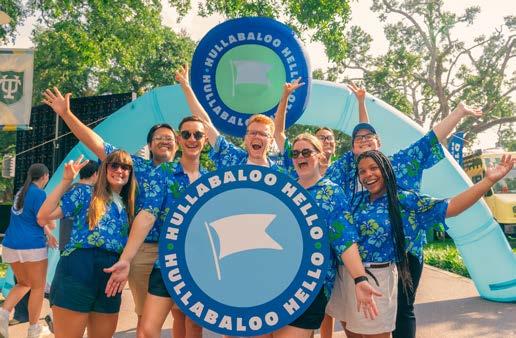
















I am so pleased to write to you as the new Dean of Newcomb-Tulane College. Though I stepped into this role this past July, I have been a member of the Tulane community since 2003. I have both a law degree and a master of health administration from the university, and I have been a member of the faculty since 2011. Over these years, I have witnessed the incredible trajectory of Tulane, and I can confidently say that the state of Newcomb-Tulane College is as strong as it’s ever been.
This fall, we welcomed just over 1800 first-year students from 49 states and 35 countries. The class of 2027 is our most academically accomplished and diverse class ever. We continue to be inspired by our students, their interests, and their ambitions. And we are so proud of them as they take the next steps. Just last year, Newcomb-Tulane College students won 24 competitive fellowships and post-baccalaureate awards, including Fulbright scholarships, Goldwater scholarships, and the Payne award (Tulane’s first-ever!).
As we near the 20th anniversary of the College's founding, we look ahead to a future brimming with possibility. We ask ourselves daily how we can continue to radically transform undergraduate education and live up to our collective aspirations for a uniquely Tulane experience. Our interdisciplinary curriculum is second-to-none and filled with experiential learning opportunities that allow students to apply what they're learning to real-world problems, locally and globally. From combatting food scarcity in our region to forecasting the ways in which A.I. could reshape our daily lives, our community of scholars make meaningful impacts in the world around them.
You may have also heard that there are new spaces opening throughout campus! We, at the College, are excited to actionize these for our undergraduates, whether it be lab space in the School of Science and Engineering’s Steven and Jann Paul Hall or design studios in the School of Architecture’s total renovation of Richardson Memorial Hall. Even the new residence halls, River and Lake Hall, feature intentionally designed collaborative spaces for us to engage with students outside of the classroom. Every moment we share with our students is a chance to stoke the fires of their intellectual curiosity and empower them in their academic journeys.
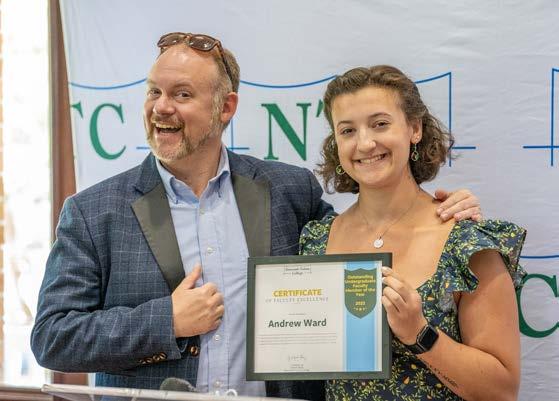
Community, Belonging, and Equity Award
Dr. Elisabeth McMahon
Undergraduate Research Mentor of the Year Award
Dr. Shusheng Wang
Undergraduate Major Advisor of the Year Award
Dr. Katherine Raymond
Career Torch Bearer Award
Dr. Cheryl Naruse
Outstanding Mentorship of First-Year Students
Dr. Jacquelyne Howard
Outstanding First-Year Seminar Instructor
Dr. John "Ray" Proctor
International Students’ Champion Awards
Dr. Elizabeth Rafferty
Dr. Seoungwoo Lee
Outstanding Undergraduate Faculty Member of the Year
Dr. Meenakshi Vijayaraghavan
Outstanding Undergraduate Faculty Member of the Year
Dr. Andrew Ward
Excellence in Undergraduate Advising
Dr. John Louis Howard
Career Development Pillar Award
Dr. Matt Barrios
Friend of the Office of Academic Enrichment
Dr. D. Jelagat Cheruiyot
Fellowship Advising Award for Exceptional Contributions
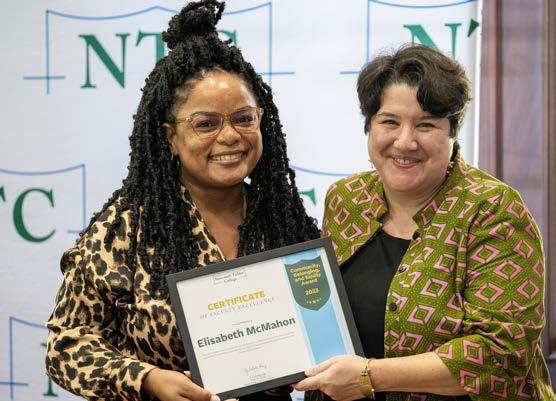
Dr. F. Thomas Luongo
Outstanding Honors Thesis Professors
Dr. Julie Markant
Dr. Han “John” Park




The Cotton Bowl victory. Two 3rd round NFL draft picks. The 2023 AAC Baseball Championship. Men’s basketball winning the bronze medal for Team USA at the World University Games. A WGCA All-American golfer. Seven consecutive years of baseball winning the Team Academic Excellence Award. Twelve studentathletes graduating with honors. 183 student-athletes on the AAC All-Academic team. Tulane has found unprecedented success both on and off the field over the course of the last year, thanks in part to the unsung heroes working tirelessly behind the scenes to support and develop our student-athletes: the NTC Athletics Advising team.
There’s a common misconception that athletic advisors only exist to remind athletes to go to class and turn in homework. This myth couldn’t be further from the truth. NTC Athletics Advising provides athletes with individualized, holistic support to facilitate their growth and achieve goals inside and outside the classroom. “Too often, academic success is inappropriately framed as nothing more than a requirement for athletes to perform in their sport,” says Nick Mazur, Learning Specialist for Athletics Advising. “That’s just categorically untrue, and part of what we do is reframe that perspective. Academics are the cornerstone of the Tulane college experience, enhances the lives of our student-athletes and prepares them for life after graduation.”
“We’re working with student-athletes throughout their entire college career. We’re there from the very first day they step on campus for onboarding and orientation all the way to cheering them on as they walk across the stage at graduation,” says Wendy Leblanc, Associate Director of Athletics Student Services. “We help student athletes explore majors that align with their passions, actionize their academic potential and provide innovative resources to meet their unique academic needs. For instance, studying and completing coursework is different when you’re traveling on a bus, or sitting on a plane, or in a hotel room across the country. The ‘typical’ on-campus resources aren’t available in these situations, and we help bridge that gap.”
The support offered by NTC Athletics Advising goes far beyond class scheduling, monitoring grades for NCAA eligibility and tutoring services. They help athletes build life-long time management habits, provide educational technology rentals, explore career and graduate education opportunities, and navigate other obstacles that make it challenging to balance athletic and academic responsibilities. Through the support provided by NTC Athletics Advising, Tulane athletes can be successful on the field, in the classroom and anywhere that life takes them after graduation.
“Athletics Advising has been a huge help since the beginning of my freshmen year,” said Ainsley Patrick, Tulane Beach Volleyball student-athlete. “Knowing that someone is there to help guide you through balancing being a student and an athlete takes away a lot of stress so that we can focus on working hard in our sport and in the classroom. When I have a conflict with traveling, my advisors have been able to help me either arrange make-up exams or proctor exams while on the trip. Tutoring has also been a great resource available through Athletics Advising, I’ve seen improvements in my grades throughout the semesters that I’ve used this resource. I always recommend that incoming freshmen take advantage of all the services Athletics Advising offers because they are here to help us succeed in our classes and enjoy our time here at Tulane.”
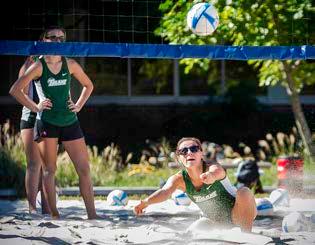

How the Wave of Support initiative is revamping Tulane's mental and emotional health support systems
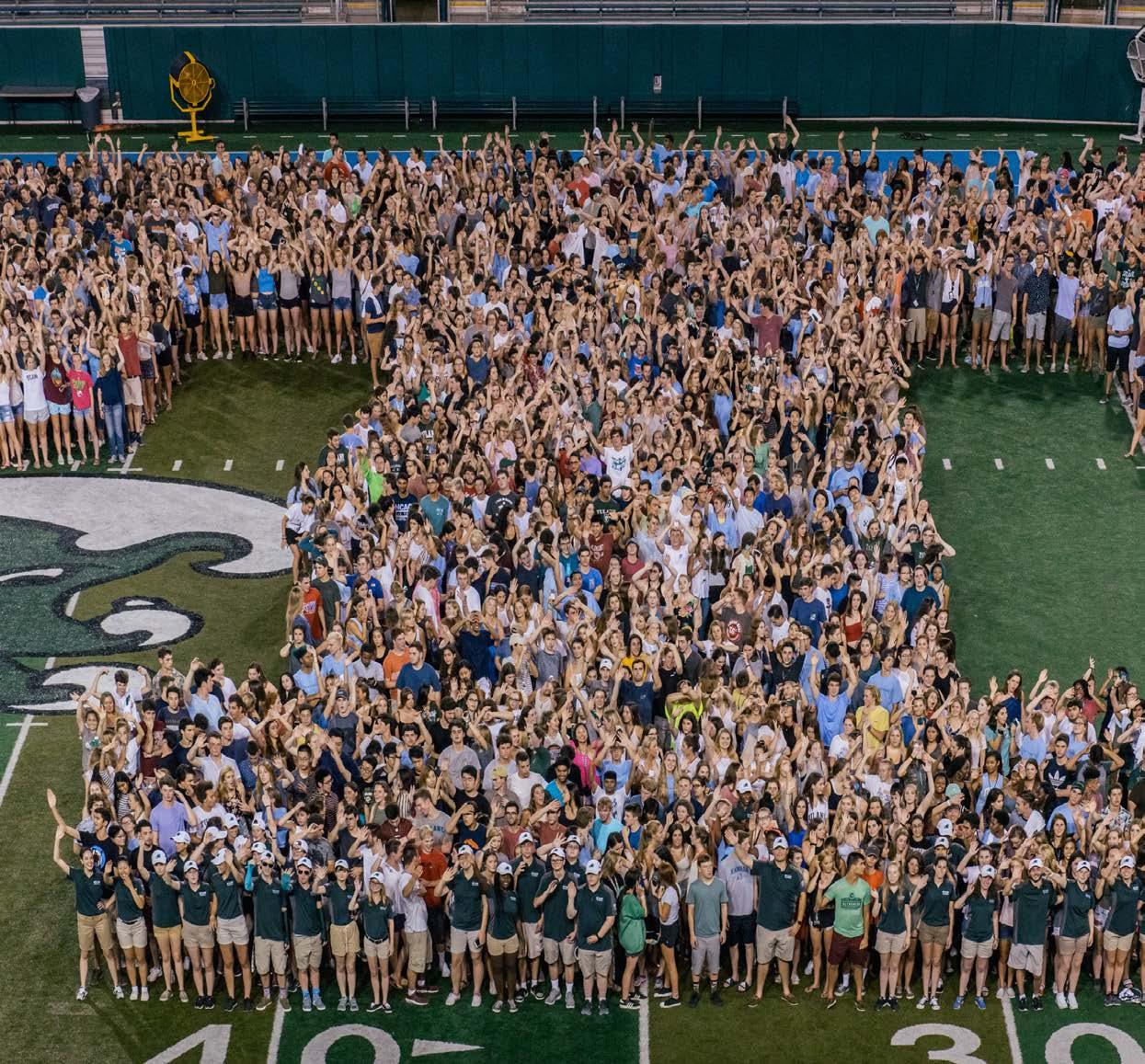
Amid an epidemic of mental health issues among college students and young people nationwide, Tulane University is emerging as a leader in confronting this crisis. Wave of Support is a campuswide, collaborative program that supports students’ mental and emotional health at Tulane. In 2021, Dr. Kathy Fields and Dr. Garry Rayant generously contributed their support, guidance, and leadership to our university to help conceive and provide a pilot of the program with an initial gift of $750,000. After this successful pilot, Tulane launched the full Wave of Support in August 2022 as a partnership between Newcomb-Tulane College and the Division of Student Affairs. The program found instant success and has already engaged with thousands of Tulane students through its highly interconnected array of student support offices. These departments stand united in their goal of building a healthier campus by enhancing the holistic experience of our students in the realm of wellbeing.
Using the 8 Dimensions of Wellness as a foundation, Wave of Support facilitates a wide variety of initiatives, including providing the campus with a suicide prevention tool called Question, Persuade, Refer (QPR) Training, the GydEd Chatbot, Faculty Advocates, Tulane’s Active Minds Chapter, and more. In September of this year, Drs. Fields and Rayant committed to an additional $3 million endowed fund to support the initiative long-term, and they invite other donors to contribute to this essential and impactful program.
In one of its most successful ventures, Wave of Support brought to life the Mentor Institute, which serves over 600 students in 18 mentoring roles across 10 campus offices. The Institute provides a universal, consolidated training program for all student mentors and supports them throughout their mentoring experience. Over 400 students have already completed the 202324 Mentor Institute course, learning about mentorship, cross-cultural communication, campus resources, suicide prevention, their responsibilities related to Title IX and bias response, and more. Whether a student is serving as a Resident Advisor, a Newcomb Peer Mentor, a First-Year Seminar Peer Mentor, or all three, the Mentor Institute prepares them to care for their own wellness while also supporting their peers.
By empowering Tulanians to define and foster their own wellbeing, Wave of Support


creates a community that is prepared, encouraged, and confident in supporting oneself, one another, and the broader Tulane community. Wave of Support utilizes innovative, theory-backed practices to build a pathway to individual and collective mental wellbeing through a campus-wide commitment to self-care and empathy. The initiative enhances self-advocacy, positive skill building, and a culture of deep attention to mental health as it pertains to all practices of the university.
Each department within Newcomb-Tulane College plays a critical role in fulfilling this mission. As crucial support providers, NTC staff members are often the initial touchpoint for students when they need assistance or additional support. Staff members work with students to provide individualized support, as well as connect them directly with the appropriate support offices to meet their unique needs. Wave of Support further empowers our staff members with special training and access to research-based resources to foster connection and meaning within their student relationships. Asking for help can be hard, but these relationships make students feel more comfortable opening up to staff members, which increases their access to mental and emotional health resources and improves the overall health of the Tulane community.
“It is incredibly important for colleges and universities to support the mental health of their students, and Wave of Support engages the entire Tulane community in this effort,” says Sam Bruce, Program Manager for Wave of Support. “This program is creating a space for deeper conversations and action around mental wellbeing, and that’s the foundation for meaningful, long-lasting change.”
“Tulane University is profoundly appreciative of Dr. Fields and Dr. Rayant for their outstanding support of our student body. The positive impact of their generosity – and how it positions Tulane to become a leader in mental health support for students – will make this program a template of excellence for similar programs at other universities worldwide. We simply couldn’t be more grateful.”
- President Michael Fitts
“The new team structure allows us to create plans and programs that are tailored to specific student populations and their needs . These changes were made with a focus on increasing student persistence, graduation, and most importantly, student outcomes beyond four-years at Tulane!”

Meeting with an academic advisor is now easier than ever with the exciting new changes to NTC College Advising. Formerly known as the Center of Academic Advising, College Advising spent the summer restructuring their operations and student support model, refining processes, and increasing the ways that students can engage with their advisors, faculty advisors on their majors, and important campus support resources.
One of the most significant changes is the establishment of three specially trained teams: the First-Year Advising team, the Liberal Arts, Public Health, and Architecture team, and the Science and Business team. The First-Year Advising team, as the name suggests, primarily works with first year students. Transitioning into college can be a challenge, and it is common for students to feel overwhelmed as they adapt to a new place, meet new people, and experience college-level academic rigor.
This advising team, in collaboration with the Office of the First-Year Experience, will ease that transition by demystifying the academic environment at Tulane by hosting programs, events, and workshops specifically tailored to first year students. Additionally, this new team will offer increased opportunities for drop-in appointments to help students get quick answers and one-on-one appointments for deeper conversations about their academic plans.
After their first year at Tulane, students will transition to either the Liberal Arts, Public Health, and Architecture team or the Science and Business team for further advising. In this new model, second year students will work with advisors to finalize their majors and minors, while upperclassmen will engage with advising as a touchstone to stay on track with completing core requirements for their degree. New to the model will be more direct pathways to engage with faculty major advisors in the schools. “Faculty are an important resource for students moving through their major(s) and minors. We want to position College Advising as a partner and resource to the school faculty as they support our students in degree completion,” said Kelly Grant, NTC Senior Associate Dean.
- Katie McBride, Director of College Advising
Building innovative advising models and practices to meet the needs of today's students
Also, new in College Advising is a specialized training program associated with the Wave of Support initiative. Wave of Support brings care for mental health to the forefront at Tulane. Through this program, advisors received training in holistic student support focused on mental wellbeing and suicide prevention.
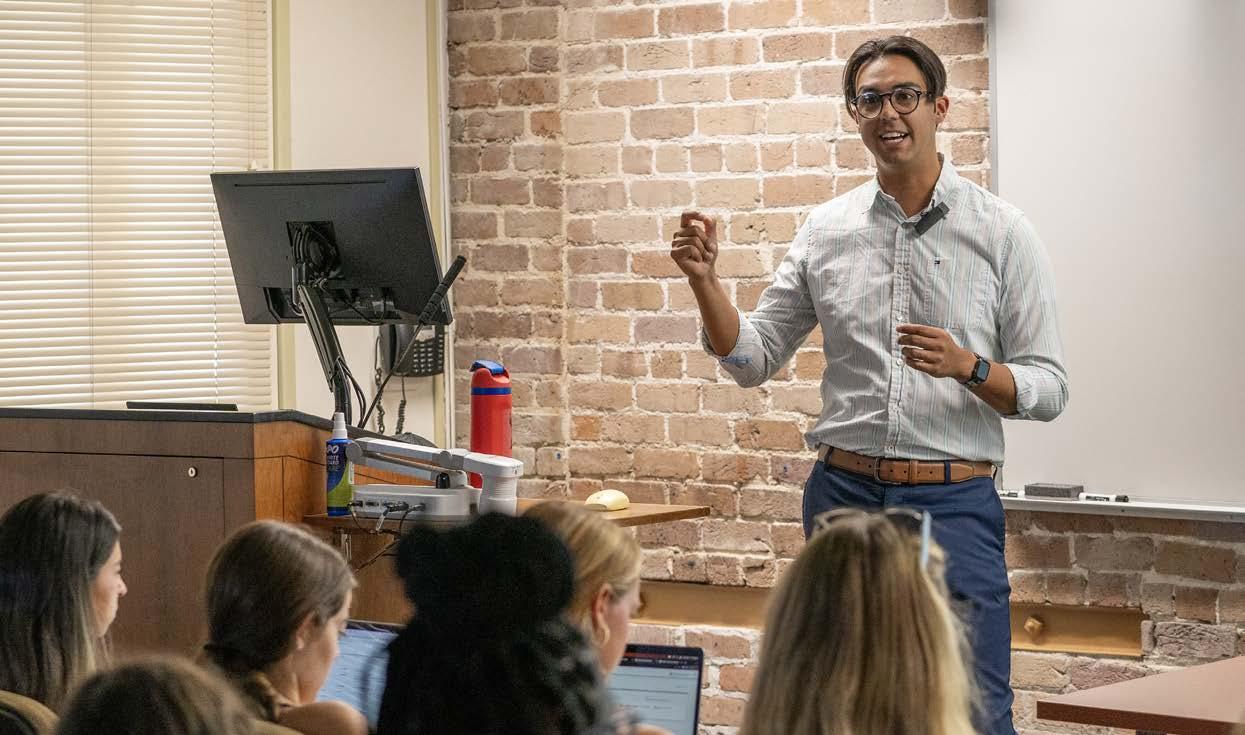
“Taking the time to slow down, be present, and re-center based on the reason we are working with students (holistic student development) has really made a big impact on me and my practice. Having the space and time to reflect on the ‘why’ behind our work and getting to share in small groups has really kept some important ideals at the forefront of my working mind. It’s easy to get lost in the process and the volume with advising, so this was a great reminder of the opportunity we have to truly connect with and foster relationships with our students," said Patrick Long, First-Year Student Advising Coordinator.
In addition to working directly with students, the advising team has been
building strategic partnerships with other student support centers on campus such as the Counseling Center, the Well, and others to make referrals as seamless as possible. These partnerships create ways for advisors to connect students directly with staff in other areas of the university depending on the needs of the student. “I’m very excited for these updates in College Advising,” says Katie McBride, Director for NTC College Advising.
“The new team structure allows us to create plans and programs that are tailored to specific student populations and their needs. It also allows our College Advisors to develop as the real experts in an academic field or flex their muscles as an advocate for certain populations of students. These changes were made with a focus on increasing student persistence, graduation, and most importantly, student outcomes beyond four-years at Tulane!”
“It was really a once-in-alifetime experience . O ur week was a combination of learning, relaxing, and having fun . I lo ved the culture and the people of Mexico and the Tulanians I met!”
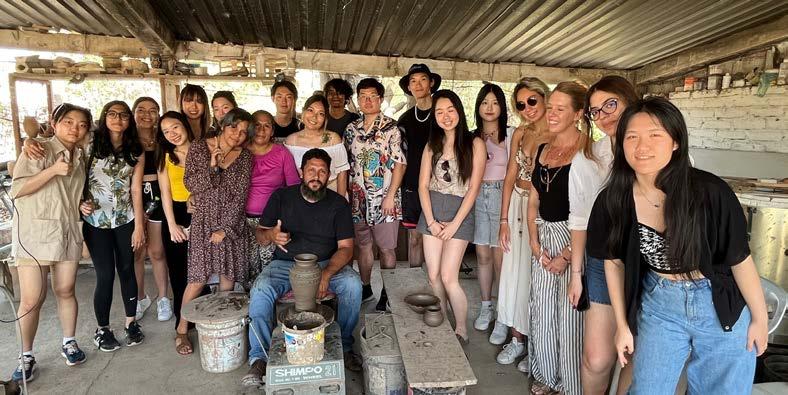
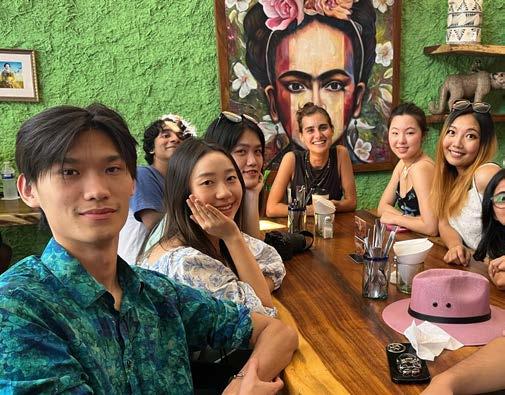

“As someone super passionate food, this trip introduced me food culture and I learned the unique agricultural values offers . I also realized how similar Chinese culture that food forming the bonding of close an international learner at inspired to learn more about cultures hidden behind the attractions

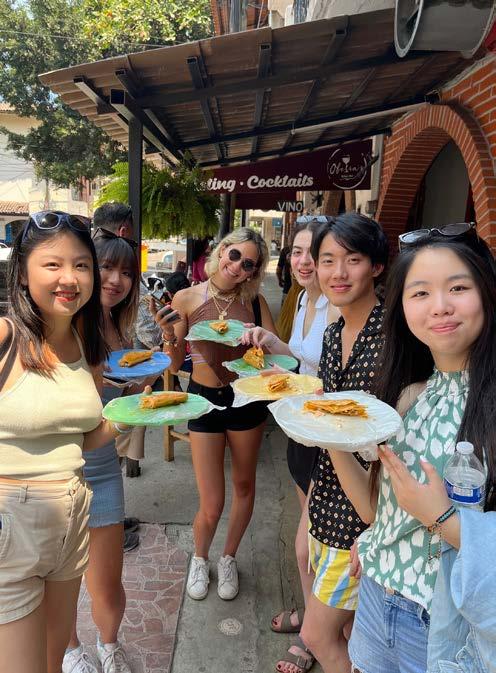
“I think the trip was such an important experience because sustainable tourism is now going to stay with me for the rest of my life, whenever I travel . ”
– Syna Pal
– Misra Kosarsoy

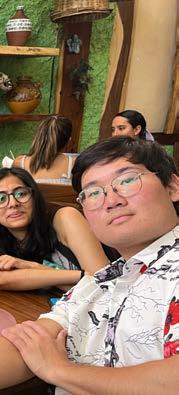
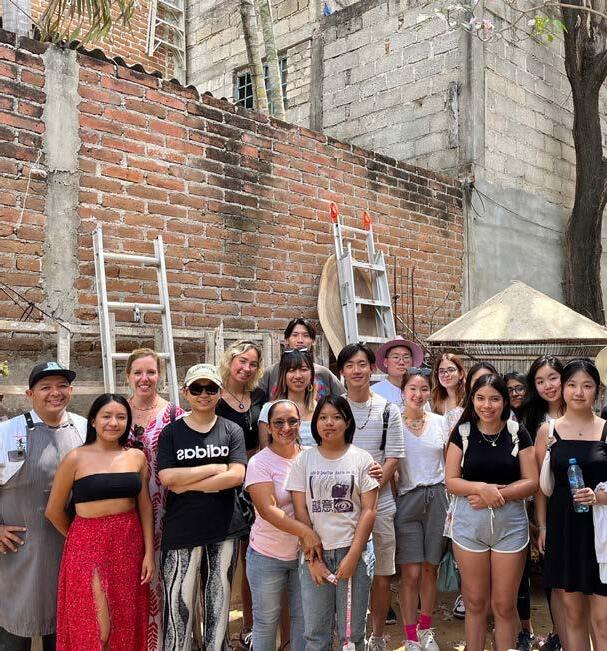
Fifteen international students hailing from China, Colombia, India and Turkey spent seven days soaking in the sunshine and Mexican culture in the Bay of Banderas region during Tulane’s spring break. The program, organized by the Newcomb-Tulane College Center for Global Education, encouraged students not only to enjoy the cultural richness and natural beauty of the region, but to think critically about how their experience enhanced their own understanding of Mexico as international learners.
Students engaged directly with local community members and entrepreneurs in the mornings including a ceramicist, artisanal chocolate makers, a Huichol jewelry maker, a Zapotec tapestry weaver, ranch owners, and farm-totable restaurateurs. Says Associate Dean for Global Education Prof. Casey Love, “This program gave the students an experience that differs from most foreign visitors. While students enjoyed typical tourist attractions, they also saw hard-working Mexicans struggling to forge a livelihood adjacent to the tourism mecca of Puerto Vallarta. The program also gave students the opportunity to reconsider their own pre-existing stereotypes of Mexico and to engage in meaningful dialogue on the impacts of tourism on local culture.”
Newcomb-Tulane College’s equity, diversity, and inclusion goals were central to this experience. International students don’t typically have the opportunity to travel home during spring break, but this Alternative Spring Break program was specifically created with these students in mind. Instead of hanging out around a mostly empty campus during the break, these students were able to explore a new country, have a meaningful, intercultural learning experience and build strong relationships with their peers.
passionate about me to Mexico’s to appreciate values this land similar it is to is crucial in close ones . As Tulane, I am about the diverse attractions . ”
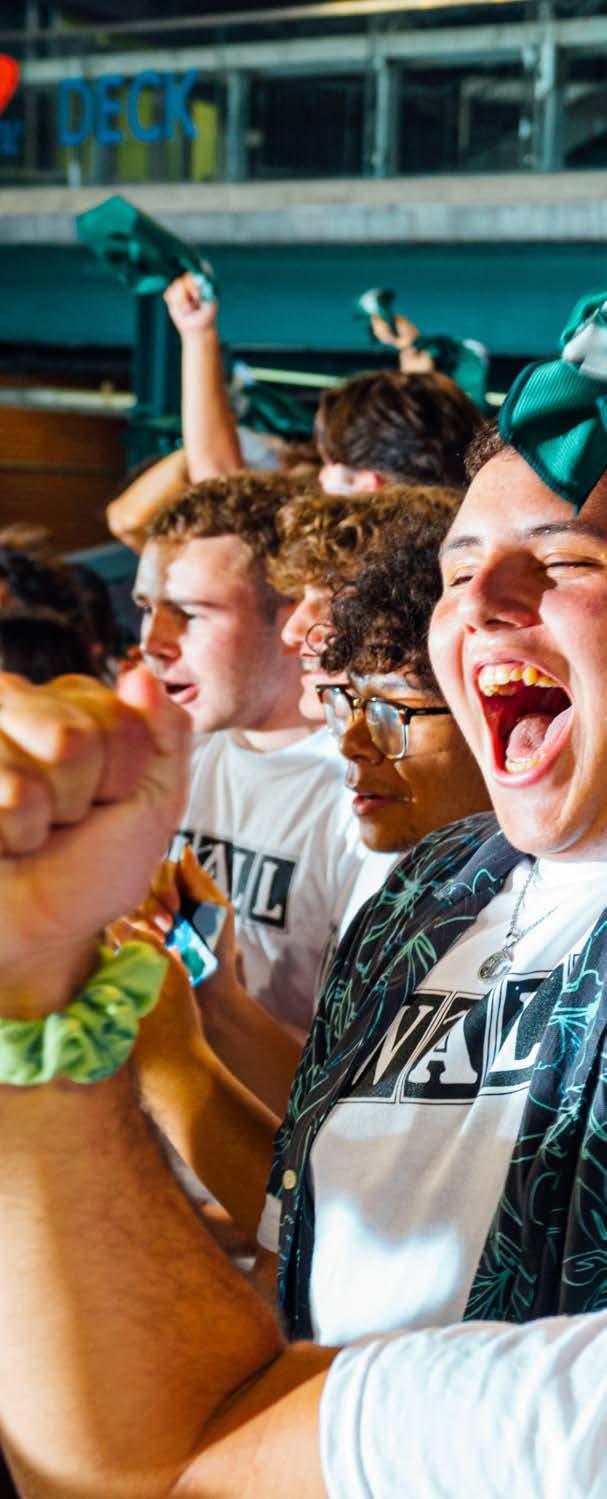
The orientation experience of yesteryear is over. Newcomb-Tulane College’s First-Year Experience team has ushered in a golden age of orientation, intentionally built from the ground up for new generations of Tulanians. Orientation is dead. Long live Hullabaloo Hello.
Facilitated by the Office of First-Year Experience in Newcomb-Tulane College, Hullabaloo Hello is a celebratory welcome to Tulane University beginning the moment new students arrive on campus. Hullabaloo Hello combines move-in, orientation programming, signature events, the President’s Convocation and so much more.
“Every aspect of Hullabaloo Hello was carefully crafted based on feedback and survey results from Tulane students,” says Cristina Lawson, Director of the NTC First-Year Experience team. “The most common request was for a format that doesn’t rely on sitting through multiple lectures, so we had to find a way to balance that feedback with the need to ensure that students still receive critically important information. To that end, we created a series of New Student Modules that started in May and carried on throughout the summer.” These modules covered topics ranging from scheduling academic advising appointments, to participating in the NTC Reading Project, to health and safety information, to accessing a wide variety of campus resources and much more.

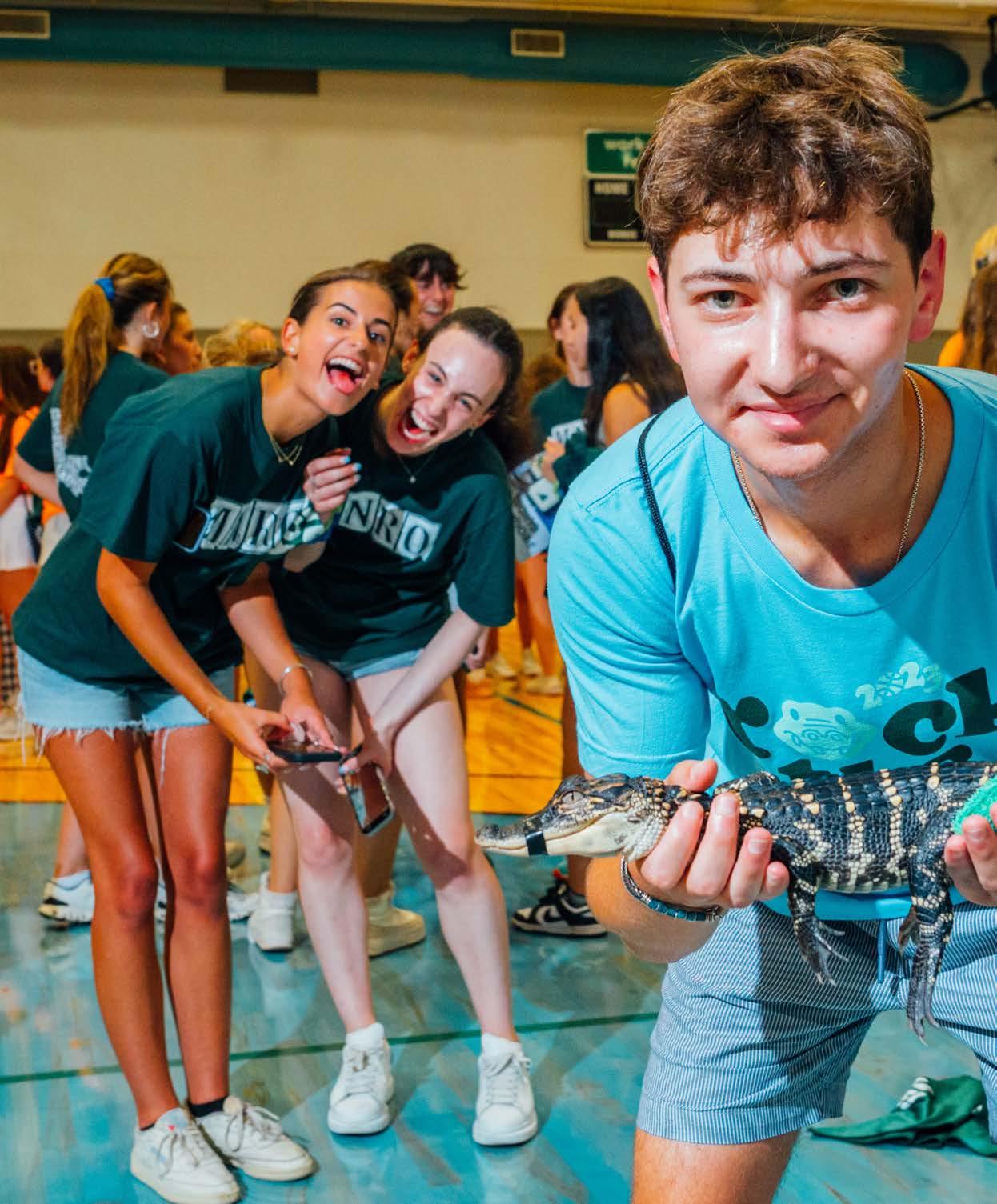
Despite being chock-full of helpful information, the New Student Modules aren’t even the largest addition to the orientation lineup. For the first time ever, students could self-select into interestbased cohorts and experience every moment of Hullabaloo Hello with peers interested in similar topics. “The social transition to college can be just as difficult, and perhaps even moreso, than the increased rigor of college academics,” says Lawson. “The cohort model allows students to meet peers with similar interests from the very first moment they step on campus. They can forge connections that blossom into life-long friendships and feel at home within the Tulane community.” These cohorts went on a variety of exciting off-campus excursions to explore New Orleans and learn more about its rich, cultural history. Mossy alligator-filled swamps, historic neighborhoods, world-class museums, and picturesque parks were among the many excursion destinations. Back on campus, Cudd Hall and Pocket Park were transformed into vibrant Mardi Gras House Floats and gave students a taste of the upcoming Carnival Season.
The Class of 2027 is one for the Tulane history books. Out of more than 30,000 applications, about 1,850 undergraduate students were admitted to Tulane University. Hailing from 49 states and 34 different countries, this class is one of the most ethnically and geographically diverse classes in university history. One student has an enviable one-block commute from their family home to campus, while the student who traveled the farthest to attend Tulane is about 10,019 miles from their home in Malaysia. A record-setting 10% of incoming students are first-generation college students, and 31% of the Class of 2027 are students of color.
There’s always something for Tulanians to look forward to, whether it’s athletic events, festivals, live music, Crawfest, signature campus programs and even just the day-to-day happenings of New Orleans. Beyond that, the Class of 2027 will experience several transformative campus projects before they walk across the stage at graduation in four short years.
The recently completed River and Lake Residence Halls opened their doors for the first time this semester to increase on-campus housing by 700 beds, in addition to featuring a state-of-the-art 200-seat auditorium, commercial-grade kitchens, a vibrant outdoor courtyard and a variety of lounge spaces for students. In addition to hundreds of students, this space also houses the Small Family Collaboration Hub, a 14,000 square foot space for students to pursue shared interests and enjoy amenities like foosball tables, pool tables, shuffleboard, and a 100-inch TV. All of this is only the first phase of The Village; a comprehensive plan to increase the impact and capacity of on-campus residential spaces and further enhance undergraduate education at Tulane. The second phase will see the construction of more residence halls and facilities for students.
The Class of 2027 will also witness major changes to academic spaces around campus. The Steven and Jann Paul Hall Science and Engineering Building is well underway and set to open in 2024. This pristine new facility will feature three floors of laboratories focused on collaborative, interdisciplinary research pursuits, an animal research lab, student spaces, and a massive auditorium for academic purposes. Richardson Memorial Hall, home of the School of Architecture, is currently undergoing renovations that will enhance the educational opportunities available to Tulane students. In addition to restoring the facades of this historic 113-year-old building, the renovation will create additional classrooms, enhance studio spaces, centralize the school’s analog and digital Fabrication Labs, and provide students and faculty with an energy-efficient modern interior.
Each year, Newcomb-Tulane College invites a distinguished alum back to campus to address students as the speaker for the John J. Witmeyer III Dean’s Colloquium. This year’s coveted honor went to Julie Greenwald ’91, Chairperson and CEO of Atlantic Music Group.
Greenwald’s experience as a music executive began in 1992 at Def Jam Records, where she would rise through the ranks and become president of The Island Def Jam Music Group. She would go on to become the president of Atlantic Records in 2004, earn a promotion to chairperson and COO in 2006, and now serves as the chairperson and CEO of the Atlantic Music Group. Along her career journey, Greenwald earned numerous Billboard Women in Music awards, including Woman of the Year and multiple Executive of the Year honors.
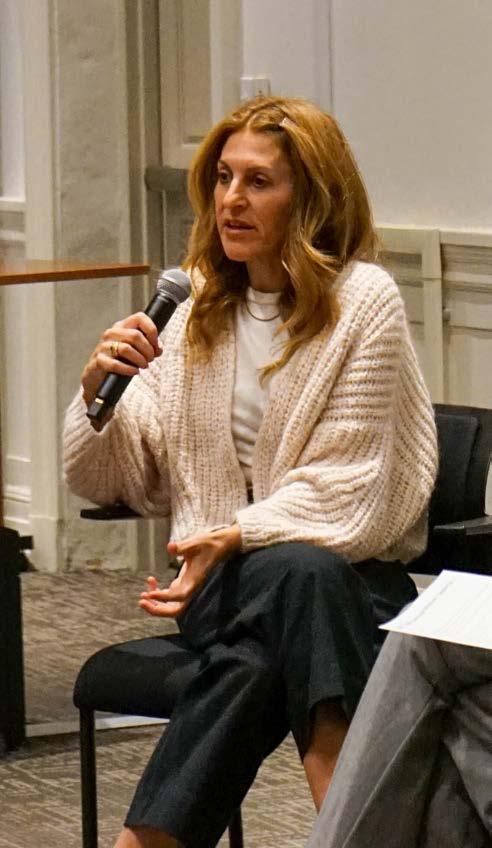
Prior to the Dean’s Colloquium address, Greenwald hosted a roundtable discussion with the ‘Race, Music, and Consciousness’ College Scholars cohort. This group, led by Dr. Sam Brandao, explores American society through the lenses of race and music. Using New Orleans as the focal point of their studies, these students examine the history of music, racial consciousness, cultural identity and racial justice. Greenwald provided her unique insights into rock, hip-hop and rap music from the perspective of a female music executive, offered important career advice, and answered questions from students with real-life examples from her experiences in the music industry.
Greenwald’s address focused on her extraordinary career path after graduating from Tulane and how Tulane prepared her to recognize and seize a range of opportunities that led her to the pinnacle of the music business—leading a global record label and interacting daily with today’s most famous music talents. She encouraged students to know themselves, work hard and take risks. To demonstrate her point, Greenwald recounted stories from her own career journey, including times when she would be scouting talent in various clubs until 3:00 a.m. and then back in the office by 9:00 a.m., all while raising two children in New York City. Her parting advice to students? Always out-hustle the competition.
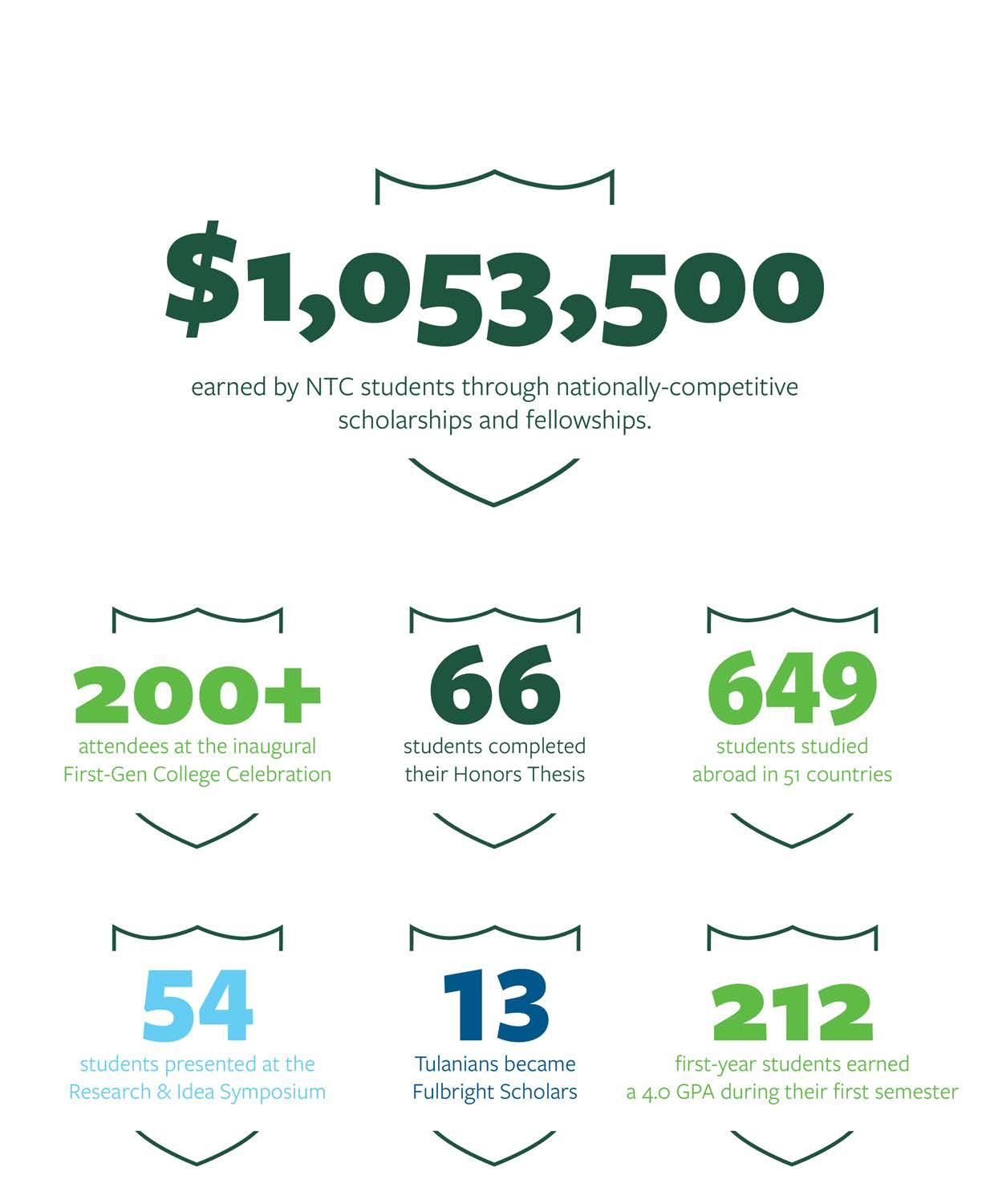
Thissemester, the Academic Learning & Tutoring Center (ALTC) forged a new partnership with the Tulane School of Liberal Arts to expand its services and support for Tulane students through the creation of the Language Learning Center (LLC). The LLC will provide students with a new avenue for growing their world language abilities through tutoring and drop-in support.
LLC tutors are specially trained by ALTC staff members with tutoring strategies tailored for all types of learners. The LLC fosters a supportive, peerdriven environment that encourages students to work together toward the common goal of mastering their chosen language. Instead of endlessly flipping through vocab flashcards by themselves, students will have a space to learn from content experts, as well as engage in group discussions and one-on-one conversations to develop their language skills.
“The Language Learning Center is our most recent collaboration with an academic department to provide easily accessible learning support for students,” said Christie Kahil, Director of the Academic Learning & Tutoring Center. “It has enabled us to expand our tutoring services for world languages and create new ways for students to learn and develop their skills outside the classroom.”
The LLC currently offers official support for students studying French, Italian, Spanish, and Portuguese, with plans to further expand to additional languages over time. Students taking courses in other world languages are welcome to utilize the LLC space, located in Newcomb Hall 408, or in the ALTC, located in Howard-Tilton Memorial Library B-01.
Students can schedule tutoring sessions with ALTC or the LLC via the Penji app, or online on the ALTC website.
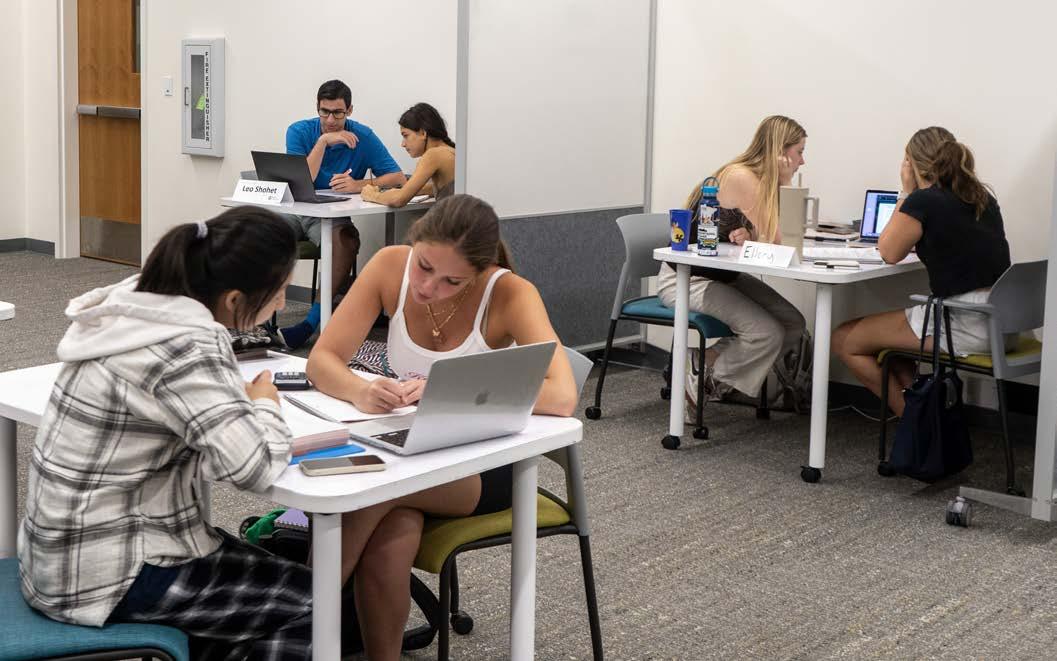
Asan internationally competitive private university, Tulane University recognizes that students’ learning and university experiences are richer in a diverse environment that is representative of an increasingly global society. The contributed cultural and social perspectives of underrepresented communities help to bring leadership, experiential wisdom, and life skills to the student body. The Center for Academic Equity (CAE) is committed to supporting Tulane undergraduate students from historically underrepresented groups with unique learning opportunities, specialized programming and generous need-based support for the entirety of their time at Tulane.
Recognizing the importance of providing need-based support to students, the NTC Dean’s Advisory Council co-chairs Amy Pasquariello NC ’98 and Steven Moffitt TC ’99 established endowed funds to support CAE. The Amy and Tony Pasquariello Endowed Fund and the Moffitt FamilyGoldman Sachs Gives Endowed Fund will provide current and future generations of students with crucial funding to support their academic journeys.
“NTC’s commitment to ensuring that all Tulane undergraduate students have real and meaningful access to the resources and dynamic opportunities provided by a Tulane education is incredible. As a proud Tulane alumna, it is a privilege to support this work with an endowment gift to the Center for Academic Equity” says NTC Dean’s Advisory Council co-chair Amy Rudnick Pasquariello NC ’98. Fellow Council co-chair Steve Moffitt TC ’99 adds, “My wife Andrea Turner Moffitt NC ’00 and I recognize that for Tulane to be the exceptional university that it is, all students, no matter their backgrounds and lived experiences, must feel that they belong here, and are both broadly welcomed into our communities and supported by Tulane’s engaged alumni network. We are thrilled to support the Center and its critical work on this front.”
The Newcomb-Tulane College Dean’s Advisory Council is a volunteer leadership group made up of a select group of alumni and parents who provide the College’s dean with valuable perspectives and experiences. They support the College’s goal of providing exceptional undergraduate experience for students in and out of the classroom, and enhancing the research, scholarship, social, and leadership opportunities for our students.
The College and the CAE are extremely grateful for the council’s support and to the co-chairs for recognizing the powerful ways their gifts positively impact our students and enhance their educational and social opportunities.
Steven R. Moffitt TC '99, Co-Chair
Amy Rudnick Pasquariello NC '98, Co-Chair
Annabelle L. Brody LA '18
Randy L. Broz TC '99
Rikki Charles
Colleen Cook
Lael Culiner
Jennifer Reichenbach Dangar NC '89
George F. Fraley III A&S '92
Marc D. Frishman A&S '91
Brendan V. Hayes TC '99
B. Daniel Hazel A&S '96
Cadambi Janardhan
Shashi Janardhan
Gerald F. Keefe A&S '93
Mariam Salari Korangy NC '96
Gregory Malik TC '94
Howard J. Margolis B '87
Ali Nabavi TC '99
Jeremy S. Perelman TC '00
Debra Polishook NC '83
Robert Polishook B '83
Lisa Ehrlich Rapkin
Michelle Rosenbaum
Donald E. Rothman A&S '79
Dawn Zimmerman Saunders B '92
Julie Segall Schweitzer B '87
Lori Rhodes Seigal NC '91
Scott A. Seigal A&S '89
Lawrence S. Sibley A&S '80
Josh Smith
Karen Roskind Sobel NC '89
Danielle Dienert Sweeney, MD NC '97, M *01
Kevin Sweeney TC '95
Alex Tolston TC '03
Jeffrey L. Turner A&S '77
Elyse Luray Weshler NC '89
Elizabeth Williams NC '00
NTC Dean’s Advisory Council Co-Chairs establish endowed funds to equitably support our students

Kyla Denwood, a 2021 NTC graduate with bachelor’s degrees in both Economics and International Development, was named Tulane University’s first-ever recipient of the prestigious Donald M. Payne International Development Graduate Fellowship Program. This highly competitive program awards fellows with approximately $104,000 in benefits to pursue graduate study in the field of international development or adjacent fields. For this year’s competition, fewer than six percent of applicants received the award.
This fall, Denwood began her master’s in Global Human Development at Georgetown’s School of Foreign Service. “The Georgetown faculty and staff really seem to care about my career development and well-being while in graduate school. After being so close to many faculty and staff at Tulane, building these relationships is something that I value in both academic and professional settings.” Denwood is concentrating on International Business Diplomacy and focuses on tackling international issues like climate change, food insecurity and the digital divide with private sector-driven science and technology policies.
Denwood previously worked as Research Assistant for the Carnegie Endowment for International Peace’s Africa Program. Before that, she served as a Youth Ambassador for the U.S. Department of State’s U.S. Pavilion at the Expo in Dubai. During her time at Tulane, she was awarded the U.S. Department of State’s Gilman Scholarship and Critical Language Scholarship and was named as a finalist for the Carnegie Endowment’s Gaither Junior Fellows Program.
"I am so honored and grateful to be chosen as a 2023 Payne Fellow and look forward to beginning my foreign service career with the United States Agency for International Development.” Denwood first learned about
the fellowship during her sophomore year as she worked with NTC’s Office of Fellowship Advising. She noted, “To call myself a Payne Fellow feels like a dream realized."
“The announcement of this honor caps an academic year in which Tulane students were finalists or recipients of some of the world’s most prestigious awards for outstanding academic performance, demonstrated leadership, and professional promise. These honors highlight Tulane’s growing reputation as a global university that welcomes, supports and prepares a diverse group of students to be the leaders of tomorrow,” Tulane President Michael Fitts said. “Being selected as Tulane’s first-ever Payne fellow is a well-deserved recognition of Kyla’s dedication and commitment to making a positive impact in the world.”
As a Payne Fellow, Denwood will deepen her knowledge through graduate study and will broaden her practical experience through internships with USAID in DC and abroad as well as mentorship and other professional development opportunities. Fellows who successfully complete their graduate programs and the USAID Foreign Service entry requirements receive appointments as Foreign Service Officers with USAID. The Payne Fellowship program is designed to support individuals from historically marginalized backgrounds on their journey to become the next generation of leaders in the field of international development.
Dean of Newcomb-Tulane College Mollye
Demosthenidy remarked, “At Newcomb-Tulane College, we strive to shape undergraduates into multifaceted, ethical leaders who have a meaningful impact in the world, and few students embody this ideal as much as Kyla Denwood. We have been honored to support Kyla along her journey so far and look forward to seeing her serve as a change-maker on a global scale.”

“Being selected as Tulane’s first-ever Payne fellow is a welldeserved recognition of Kyla’s dedication and commitment to making a positive impact in the world . ”
- President Michael Fitts
"To call myself a Payne Fellow feels like a dream realized . "
"Overcoming the challenges required persistence and dedication, which is way easier said than done . I always thought ‘blood, sweat and tears’ was just an expression, but it turned out to be much more real than I ever expected . "
- Joel Griffin ('21)Griffin (’21) hails from the sleepy beach town of Madison, Connecticut. He grew up eating a variety of New England staples, but one dish stood head and shoulders above the rest: the lobster roll. To his dismay, after moving across the country to attend Tulane, Griffin was unable to find lobster rolls anywhere in the city. Spurred on by the lack of this tasty dish and his own entrepreneurial spirit, Griffin took matters into his own hands and launched Joel’s Lobster Rolls in October 2021.
From humble beginnings as a popup tent just off Tulane’s campus, Joel’s Lobster Rolls is now a thriving food truck seen all around the New Orleans area and beyond! We sat down with Joel to learn more about his journey from Tulane undergraduate to lobster roll entrepreneur.
In the land of the crawdad, what made you want to sell lobster?

Lobster rolls are so ubiquitous in New England, I was sure they would do well here. I always make this comparison: You know how fried chicken is so popular here, they sell it in gas stations? That’s kind of like how lobster rolls are in the Northeast. Diners sell them, delis sell them, and even McDonalds sells them during certain parts of the year. Since food this popular didn’t exist in any capacity in New Orleans, I was confident taking my chances against the crawfish. After all, lobster is just a better tasting crawfish!
What inspired you to start your own lobster roll food truck business, and how did you get started in the food industry?
Right when I turned 16, I got my first
job working at the local clam shack in my hometown. This was my first exposure to the service industry. I worked at that restaurant for years, through high school and partly through college. It was here that I learned how to make a lobster roll, along with other delicious New England classics! In college, I continued working in the service industry, serving at Shaya and bartending at The Boot. Pretty funny to think that the service industry is the only industry I’ve worked in, but all of my knowledge and experience in this area helped immensely when starting my business.
I, like many other Tulane students, am from the Northeast, specifically Connecticut. Lobster rolls are such a common food up there, that I was shocked that New Orleans didn’t have any when I moved down here for school. Every time I’d go home for a school holiday, one of the first things I would do was treat myself to a roll. All throughout my time at Tulane, I’d ask local Tulanians if they knew where I could get a lobster roll and every time, the answer was ‘not in New Orleans.’
After graduating from Tulane, I found myself asking that question again: where can I get a lobster roll? That was my ahhah moment. I realized I couldn’t be the only nostalgic transplant missing their hometown food, and that there was a niche to fill.
What challenges did you face when starting your business, and how did you overcome them?
Probably the biggest challenge was making the transition from selling lobster rolls to college students outside The Boot to selling them to locals all throughout New Orleans. My first popup was outside The Boot because I knew the market would be full of people like myself: college students from the Northeast craving some good hometown food. Considering that lobster rolls aren’t ‘a thing’ in New Orleans, it also helped that this market would even know what a lobster roll was!
I was comfortable and familiar setting up outside The Boot, but I knew that if I wanted this business to be sustainable, I couldn’t just rely on the Tulane crowd. I needed to branch out and serve the actual locals of New Orleans.
This was challenging in many aspects. First, I had nowhere to start. I was only able to set up outside The Boot because I had personal connections from having worked there throughout undergrad. Second, many New Orleans locals didn’t know what a lobster roll was. A lot of people thought it was sushi! Third, the price of lobster and lobster rolls. This is an admittedly expensive food, and I still get pushback on the price to this day.
Overcoming the challenges required persistence and dedication, which is way easier said than done. I always thought ‘blood, sweat and tears’ was just an expression, but it turned out to be much more real than I ever expected. There were some painfully slow weeks that flooded me with self-doubt. But I was certain that if I just kept going, word would spread, and people would show
up. In the beginning, I didn’t want to spend anything on marketing, so I was only relying on word of mouth and social media.
What advice would you give to Tulane students who are interested in starting their own food truck business?
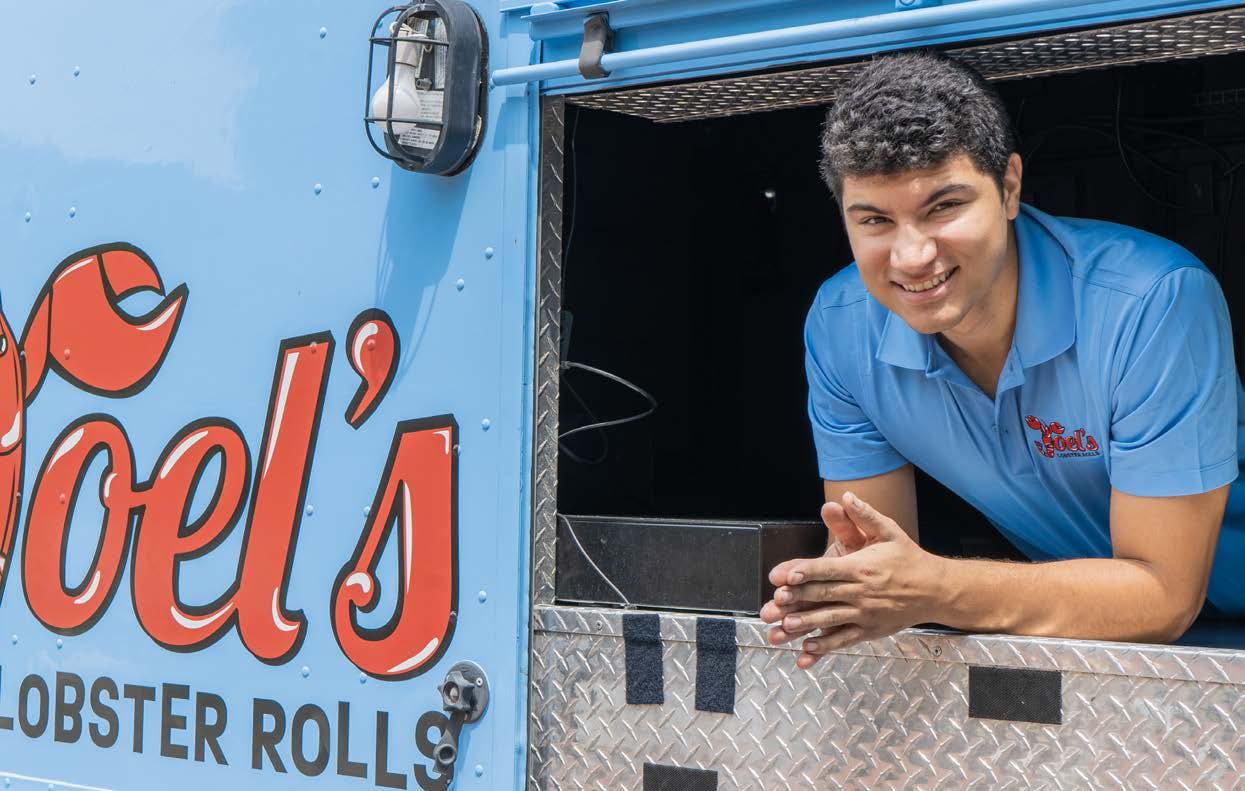
Don’t buy a food truck at the very beginning! Start as a popup first to test the market and see if people even like your food. Food trucks are really expensive, both upfront and with the ongoing maintenance costs.
Also make sure your food is differentiated. Make sure nobody in town is doing what you’re doing. Personally, I would never start a burger food truck. While your burger may be the best burger in the world, it’s going to take a very long time for people to know that. People already have their favorite burger place. Changing people’s food habits is a lot harder than making new habits. By default, I’m already everyone’s favorite lobster roll in NOLA!
Your philanthropic gifts to Newcomb-Tulane College allow us to initiate significant undergraduate academic support, enhance enrichment programs, and provide the highest quality academic opportunities to all students. Your support allows us to create unique experiences for our students.
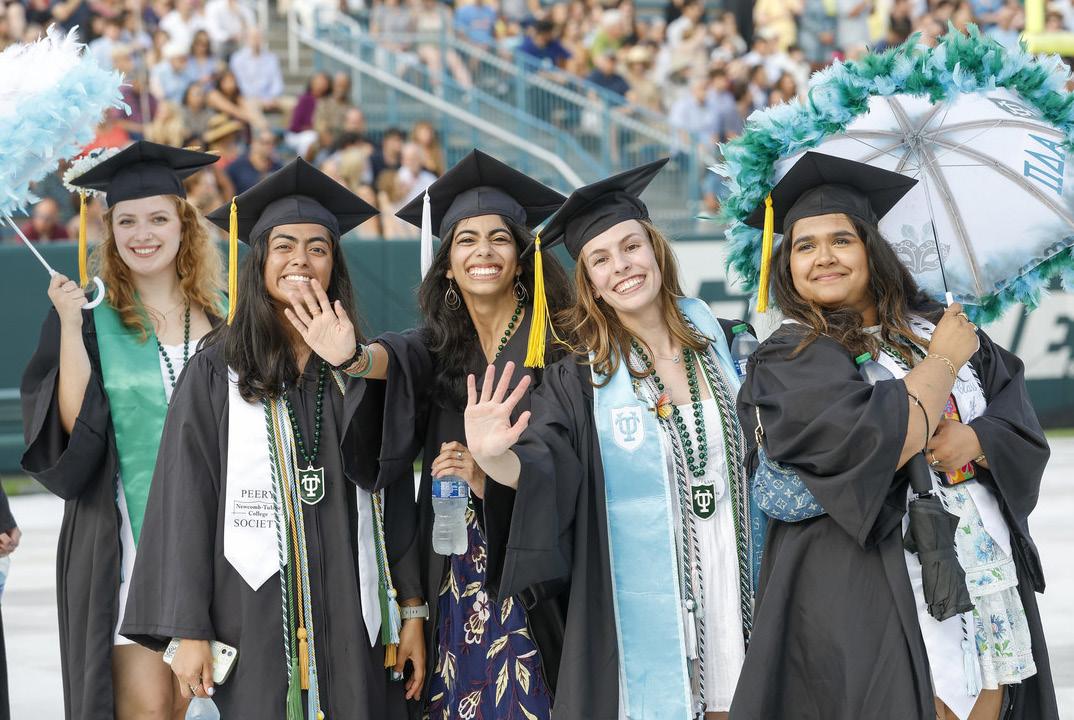
For more information about giving to NTC, contact Ryan Meck, Director of Development, at rmeck@tulane.edu
Gifts made to Newcomb-Tulane College have a tangible impact on our students, their academic success and their college experience. With your support, we remain at the national forefront of undergraduate education and provide our students with life-changing opportunities on a daily basis.
Programs and services like Hullabaloo Hello, Wave of Support, Career Exploration and Preparation, Global Education, Study Abroad initiatives, scholarships, Peer Advisors, Success Coaching, College Scholars and more are grown and enhanced by your generosity.
